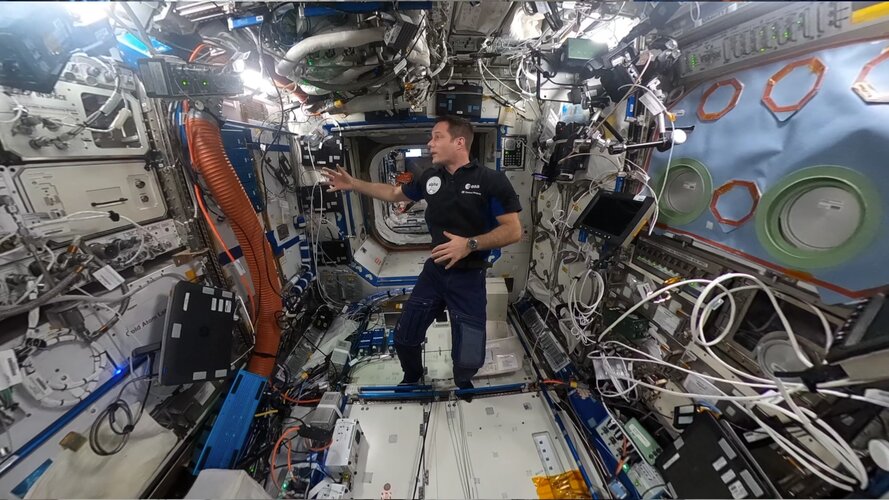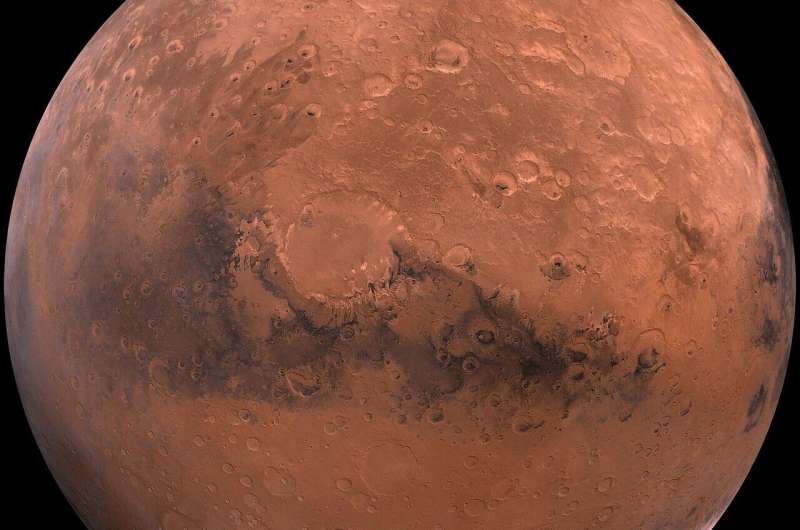
Copernical Team
First Russian film in space an 'experiment': director

Russian film director Klim Shipenko said Monday the first movie in orbit would be an "experiment," on the eve of his journey into space hoping to beat a rival Hollywood project.
The 38-year-old director and one of Russia's most famous actresses, Yulia Peresild, 37, are due to blast off from the Baikonur Cosmodrome, Kazakhstan at 0855 GMT on Tuesday to shoot scenes for upcoming Russian movie "The Challenge".
Russia's space agency Roscosmos is sending them into orbit with experienced cosmonaut Anton Shkaplerov, 49. Cosmonauts on board the International Space Station are expected to appear in cameo roles in the film.
The 12-day mission was announced in September 2020, four months after a Hollywood project involving "Mission Impossible" actor Tom Cruise was revealed.
"We are doing an experiment," Shipenko told reporters.
"There is nobody to get advice from. There is not a single cameraman who could answer how to work with light from a porthole," he told an online news conference.
On top of directing, he will also be handling the cameras, lighting, sound and make-up.
Shipenko conceded that "some things will work out and some things will not".
Space physician training course: call for applications

Are you a qualified physician? Would you like to gain insight into the field of space medicine? ESA is once again seeking medical doctors for its out-of-this-world training course and this is your chance to apply.
Meeting Mercury
 Video:
00:01:01
Video:
00:01:01
A beautiful sequence of 53 images taken by the monitoring cameras on board the ESA/JAXA BepiColombo mission as the spacecraft made its first close flyby of its destination planet Mercury on 1 October 2021.
The compilation includes images from two of the three Monitoring Cameras (MCAM) onboard the Mercury Transfer Module, which provides black-and-white snapshots at 1024 x 1024 pixel resolution. It is not possible to image with the high-resolution camera suite during the cruise phase. The MCAMs also capture parts of the spacecraft: MCAM-2 sees the medium-gain antenna and magnetometer boom, while the high-gain
First Copernicus satellite exceeds design working life

This week marks seven years since the very first satellite that ESA built for the European Union’s Copernicus programme started delivering data to monitor the environment. The Sentinel-1A satellite has shed new light on our changing world and has been key to supplying a wealth of radar imagery to aid disaster response. While this remarkable satellite may have been designed for an operational life of seven years, it is still going strong and fully expected to be in service for several years to come.
Destiny | Space Station 360 (in French with English subtitles available)
 Video:
00:02:06
Video:
00:02:06
ESA astronaut Thomas Pesquet takes you on a tour of the International Space Station like no other. Filmed with a 360 camera, the Space Station 360 series lets you explore for yourself alongside Thomas’s explanation – episode seven is NASA’s Destiny laboratory.
The International Space Station’s fourth module, Destiny, was waunched on 7 February 2001 on Space Shuttle Atlantis. The American module is the heart of the non-Russian part of the Station and allows experiments to be performed in many disciplines, from biology to physics, including a rack for burning liquids in weightlessness and the European Microgravity Science
Video: We asked a NASA technologist – is there oxygen on Mars?

Is there oxygen on Mars? Technically yes, but it's nothing like the amount we have on Earth. So breathing is out of the question. However, there is a lot of carbon dioxide (CO2) on Mars.
Now, a new technology—MOXIE—has proven that we can convert Martian CO2 into oxygen for use by future explorers. NASA engineer Asad Aboobaker tells us more.
Extending LIGO's reach into the cosmos
 Since LIGO's groundbreaking detection, in 2015, of gravitational waves produced by a pair of colliding black holes, the observatory, together with its European partner facility Virgo, has detected dozens of similar cosmic rumblings that send ripples through space and time.
In the future, as more and more upgrades are made to the National Science Foundation-funded LIGO observatories-one in
Since LIGO's groundbreaking detection, in 2015, of gravitational waves produced by a pair of colliding black holes, the observatory, together with its European partner facility Virgo, has detected dozens of similar cosmic rumblings that send ripples through space and time.
In the future, as more and more upgrades are made to the National Science Foundation-funded LIGO observatories-one in NASA awards Sun-Sky Scanning Sun Photometers for the AERONET Project
 NASA has awarded a contract for Sun-Sky Scanning Sun Photometers to CIMEL Electronique of Paris, France to support the AErosol RObotic NETwork (AERONET).
This is a firm-fixed-price, indefinite delivery/indefinite quantity contract with an estimated total ordering value of $10M. The five-year period of performance begins on September 28 and includes one six-month option. The work will be pe
NASA has awarded a contract for Sun-Sky Scanning Sun Photometers to CIMEL Electronique of Paris, France to support the AErosol RObotic NETwork (AERONET).
This is a firm-fixed-price, indefinite delivery/indefinite quantity contract with an estimated total ordering value of $10M. The five-year period of performance begins on September 28 and includes one six-month option. The work will be pe NASA confirms Roman Mission's flight design in milestone review
 NASA's Nancy Grace Roman Space Telescope has successfully passed its critical design review, signaling that all design and developmental engineering work is now complete.
"After seeing our extensive hardware testing and sophisticated modeling, an independent review panel has confirmed that the observatory we have designed will work," said Julie McEnery, the Roman Space Telescope senior pro
NASA's Nancy Grace Roman Space Telescope has successfully passed its critical design review, signaling that all design and developmental engineering work is now complete.
"After seeing our extensive hardware testing and sophisticated modeling, an independent review panel has confirmed that the observatory we have designed will work," said Julie McEnery, the Roman Space Telescope senior pro Investigating the potential for life around the galaxy's smallest stars
 When the world's most powerful telescope launches into space this year, scientists will learn whether Earth-sized planets in our 'solar neighborhood' have a key prerequisite for life - an atmosphere.
These planets orbit an M-dwarf, the smallest and most common type of star in the galaxy. Scientists do not currently know how common it is for Earth-like planets around this type of star to ha
When the world's most powerful telescope launches into space this year, scientists will learn whether Earth-sized planets in our 'solar neighborhood' have a key prerequisite for life - an atmosphere.
These planets orbit an M-dwarf, the smallest and most common type of star in the galaxy. Scientists do not currently know how common it is for Earth-like planets around this type of star to ha 
